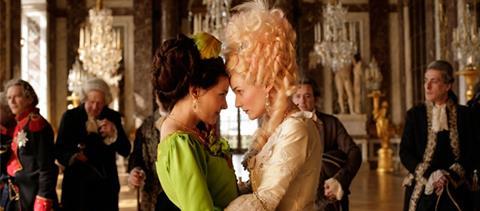Dir: Benoït Jacquot. France-Spain. 2012. 100mins

Often regarded with critical suspicion (especially when it comes to festival opening films), the genre of historical drama gets an honourable dust-down with Farewell My Queen (Les Adieux à la Reine), an Upstairs Downstairs-style story of Versailles in the days of the French Revolution – in other words, the picture of a magnificent but rot-riddled vessel about to go down like the Titanic.
Intelligently crafted and laudably serious as it is, the film should also benefit from contemporary resonances.
Among French auteurs, Benoît Jacquot has a somewhat nebulous profile, largely because of his hyper-versatility, but he’s likely to score a modest success with this elegantly-mounted yet dramatically austere drama, a considerably more elaborate piece than his last period venture, 2009’s Deep In The Woods. The film opened the Berlin International Film Festival.
The film should score with upmarket audiences, partly for its evocation of a key historical moment, tinged with elements of Sapphic love triangle and splashes of painterly nudity; partly because it has an irresistible, intelligent lead in Léa Seydoux whose rise (both in France and in Hollywood product like the latest Mission: Impossible) is proving relentless. Dramatic unevenness and an occasionally stolid feel will limit box-office, but at fests and within a mature niche, the film should be eminently exportable.
The drama, set over several days, begins with the caption ‘July 14th 1789’, which in historical terms is equivalent to telling us it’s 9/11, an hour or two before the planes hit. Sidonie Laborde (Seydoux) is a member of the household at Versailles, a lowly but trusted reader to the Queen, Marie Antoinette (Kruger).
Sidonie’s devotion to the Queen knows no bounds, and there’s a definite erotic tremor between them – but Her Majesty’s real passion is for her favourite Gabrielle de Polignac (Ledoyen), as much hated in the court as an opportunist as she is by the people. The 14th of July is a calm day at Versailles, but come evening, dark rumours trouble this sealed, vulnerable realm whose splendour is built, literally, on a swamp (hence the prominent background croaking of frogs).
While aristos, many of them decrepit, fret in the decidedly ungilded corridors below stairs, Sidonie learns that the Bastille has been stormed. Knowingly awaiting catastrophe, Sidonie seizes the moment to have an abortive clinch with a handsome young gondolier (Vladimir Consigny), while being constantly summoned to cater to the latest whim of the mercurial Queen – for whom respect around the palace is rapidly dwindling.
As nobles begin to flee, and the palace at night begins to resemble a haunted house, the composed Sidonie manages to keep her head while all around lose theirs – as they soon must, literally, with the revolutionaries’ newly published decapitation hit list causing further panic.
It’s when the film takes us backstage behind the public drama that it’s most effective, Romain Winding’s superb photography making the most of candle- and fire-lit chiaroscuro, and playing silk and satin luxury against the drab severity of Versailles’ stoneworks (the film is partly shot in the real palace).
Adapted from Chantal Thomas’ novel, the film makes the most of the traditional device of showing us world events from the perspective of a second-string bit player, and Seydoux makes an affecting representative of ordinariness, as do other French stalwarts including Julie-Marie Parmentier, Lolita Chammah and Noémie Lvovsky as Sidonie’s superior (her presence bringing curious echoes of that other recent French drama of a dying closed world, House Of Tolerance).
The drama tends to slacken considerably, though, when it shifts into something more closely resembling conventional costume mode and – solidly affecting though her performance is – Diane Kruger’s troubled Queen is too routinely theatrical a grande dame to really engage.
This is a solid, sometimes provocative piece, although substantially more old school than the knowingly hip revisionism of Sofia Coppola’s Marie Antoinette. Still, intelligently crafted and laudably serious as it is, the film should also benefit from contemporary resonances – what could be more timely in the recession era than the picture of a gilded, pampered elite provoking the wrath of the public?
Production companies: GMT Productions, Les Films du Lendemain, Morena Films, France3 Cinema, Euro Media, Invest Image
International sales: Elle Driver, www.elledriver.fr
Producers: Jean-Pierre Guerin, Kristina Larsen, Pedro Uriol
Executive producer: Christophe Valette
Screenplay: Gilles Taurand, Benoït Jacquot, based on the novel by Chantal Thomas
Cinematography: Romain Winding
Editor: Luc Barnier
Music: Bruno Coulais
Main cast: Diane Kruger, Léa Seydoux, Virginie Ledoyen, Xavier Beauvois, Noémie Lvovsky, Michel Robin, Julie-Marie Parmentier, Lolita Chammah, Marthe Caufman, Vladimir Consigny





















